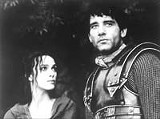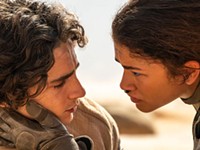[
{
"name": "500x250 Ad",
"insertPoint": "5",
"component": "15667920",
"parentWrapperClass": "",
"requiredCountToDisplay": "1"
}
]
Centuries of Arthuriads suggest that every age creates its own version of the great saga, probably the most important single myth for literature in Western Europe, particularly in Great Britain. The many stories of knightly valor and honor, the fellowship of the Round Table, the grand quest for the Holy Grail have inspired countless works, including poems, novels, plays, operas, films, animated cartoons, and comic strips.
As long as civilization endures, that narrative should never perish. Claiming that their work is the "definitive" version of those oft-told tales, the makers of the new movie King Arthur, however, almost succeed in the difficult task of obliterating the accumulated wonders of an ancient tradition.
Grounding the marvelous, energizing legends in someone's idea of "history" rather than depending upon the gradual accretions of time, racial and individual memory, and some actual human imagination, the filmmakers rob the tales and the characters of most of their excitement and all of their magic. Instead they substitute a literal, heavy handed, and entirely dubious interpretation of the material.
Despite all the obvious expense and its highly publicized authenticity, the makers of the new King Arthur transform their source into a ridiculously inflated, nervously self conscious, and abysmally dull version of a story that should be almost impossible to tell badly.
According to the absurd script, the original Arthur is not British but a fifth-century Roman soldier named Lucius Artorius Castus (Clive Owen), the half-British, half-Roman commander of a unit of Eastern European cavalry in the service of Emperor Marcus Aurelius. He and his men, among them such famous names as Lancelot, Gawain, Galahad, Bors, and Tristan --- the names don't sound terribly Eastern European, but that's about as close as the movie approaches to the Knights of the Round Table --- defend one group of Britons against the Woads and the Saxons.
Since all the characters tend to look and dress alike, the alleged ethnic differences rarely emerge from among the crowds of extras, and the particular points of dispute that motivate the central conflict never really emerge from the murky conception, the confused plot, and the mists of time.
Once they introduce the familiar figures, the filmmakers either forget about the characters or simply employ them as movable cardboard cutouts, largely just filling space and now and then answering to their names so we can occasionally tell them apart. The movie begins, for example, with Lancelot (Ioan Gruffudd), but that major Arthurian personage soon settles into a minor role, never allowed the famous romance with Guinevere (Keira Knightley) or the betrayal of his friend and sovereign. The Round Table itself suffers a population decline, so that the one scene in which it appears, with a few empty chairs scattered around, suggests something of the sadness and desolation of a restaurant after closing time.
Aside from depopulating the company of noble warriors, the writer and director also transform the rich fantasy of the stories, its speaking landscape and marvelous figures, into something drab and dreary. Merlin, the great magician (Stephen Dillane), for example, here exercises no special powers, foretells no future, provides no advice to Arthur, but simply serves as the leader of the Woads, at first Arthur's enemy, then later his ally.
Denied even a hint of a flirtation with Lancelot, Guinevere straps herself into some sort of harness, paints herself blue and joins Arthur's forces, firing arrows all over the place and acquitting herself as well as any of the soldiers, no doubt another moment of fifth-century authenticity.
Aside from the vast disappointment of the script, for all its battle scenes, the movie rarely attains any sense of life. The repeated skirmishes of various sizes all begin to look alike, the characters barely acquire even a modicum of individuality or differentiation, the lighting too appropriately suits the Dark Ages, and the emotional tone seldom transcends the lugubrious. Clive Owen's stolid manner, saturnine face, and graceless movements suggest not so much a fierce Roman warrior, the man who would be king, or the lover of Guinevere, as some minor movie heavy dressed up in the wrong clothes and feeling quite uncomfortable about the whole business.
The writer, David Franzoni, and the director, Antoine Fuqua, deserve some odd kind of credit for an act of reverse alchemy. Inheriting a cast of characters and an immortal narrative that inspired artists as different as Malory, Tennyson, Mark Twain, Wagner, T.S. Eliot, and Raymond Chandler, they turned all that shining golden possibility into a dull, leaden story with only the barest suggestion of any beauty or even meaning. If King Arthur really is their version of history, most of us, I am sure, would much prefer the myth.
King Arthur (PG-13), starring Clive Owen, Ioan Gruffudd, Keira Knightley, Maos Mikkelsen, written by David Franzoni, directed by Antoine Fuqua. Cinemark Tinseltown, Loews Webster, Pittsford Plaza Cinema, Regal Culver Ridge, Regal Eastview, Regal Greece Ridge, Regal Henrietta.
Speaking of King Arthur
-
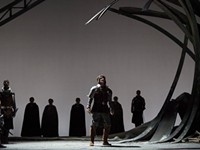
CLASSICAL: "Camelot"
Jul 31, 2013 - More »
Latest in Movie Reviews
More by George Grella
-

Film Review: "Cake"
Jan 26, 2015 -
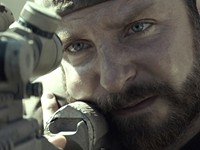
Film Review: "American Sniper"
Jan 19, 2015 -
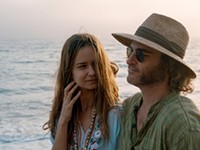
Film Review: "Inherent Vice"
Jan 12, 2015 - More »
